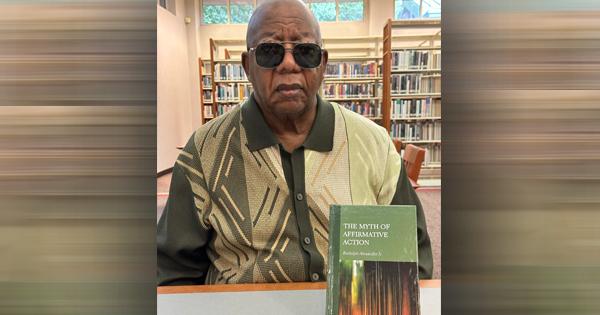
Nationwide — In his recently published book, The Myth of Affirmative Action, published by Ethics International Press, Dr. Rudolph Alexander, Jr says White society has long scapegoated Blacks for social conditions.As one example, researchers found a strong correlation between the price of cotton and the number of lynchings of Black people. Dr. Alexander comments, “Now, Whites feel if they do not get into college or get a job, it is because Blacks receive affirmative action and racial preference over more qualified Whites in education and employment.”
Dr. Alexander asserted this myth is vastly false in his recent book, now available in paperback on Amazon. For instance, in the academic arena, the University of Wisconsin admitted one year 27 Black students with ACT scores between 16-19, which many Whites would consider low and an example of affirmative action. However, the same year, the University of Wisconsin admitted 429 White students with scores between 16-19. Also, the University of Wisconsin admitted five White students with scores below 15 and admitted one White student with a score of 13. These types of numbers involving Whites typically are not disclosed.
Moreover, a White law professor, who wrote that he had adopted a Black son and thereby could not be a racist, argued that Black students should not go to elite law schools because their median score was lower than Whites on the LSAT. The law professor compared over 1,800 White students to about 140 Black students. The median score is where the middle of distribution of scores lies, which means that about 900 Whites were below the median for their group and 70 Black students were below the median for their group.
Dr. Alexander requested to see the law professor’s data to examine the 900 Whites scoring below the median to the 70 Blacks scoring below the median. Suspecting that the data would show something similar to the University of Wisconsin data, Dr. Alexander never received a response from him.
Statistically, the mean and median are misunderstood and used to conclude that Whites suffer disadvantages when compared to minorities, who allegedly get affirmative action and racial preference. However, a few highly scholastically skilled White students can increase both the mean and median for their group, obscuring average and below average White students.
In the perceived racial preference in the employment arena, Donald Trump said if he could turn Black, he would because a highly educated Black person received preference for a job over Whites. Saying something similar, a retired White female professor said in 2023 that her career would have been better if she were Black. However, the data show something different. Labor statistics show that Blacks do not occupy high-level jobs, in great numbers, in society. Among less educated people, Blacks are at the bottom when employers hire.
The late sociologist, Dara Strolovitch, who won an award for her dissertation as the best in sociology, studied in an experimental design the relationship among race, perceived criminal record, and employment opportunities in Milwaukee, Wisconsin. An experimental design is seldom performed because social agencies balk at random assignment to experimental and control groups in the social sciences, but it is highly esteemed. Later, Dr Strolovitch replicated her study in other cities, demonstrating the strength of her findings. She found consistently that Blacks were at the bottom of job opportunities and found that Whites with a criminal record had a better chance of getting a job than Black people without a criminal record.
Professor Alexander examined employment statistics over decades and found that the Black unemployment rates have always been the highest. In Ferguson, Missouri, Blacks between ages of 16-24 had an unemployment rate of 41 percent. He comments, “If there existed an affirmative action policy benefiting Blacks and employers have been forced to hire unqualified Blacks, the unemployment rate for Blacks would be zero.”
A common belief among Whites is that they are the victims of reverse discrimination because of affirmative action, which is legally actionable in court. However, EEOC data indicate that about one percent of discrimination complaints involve Whites as complainants. Also, the legal database does not show one White person who has won a discrimination case when he or she lost a job due to a less qualified Black being hired.
On the other hand, when Blacks file lawsuits against employers claiming that they were more qualified than Whites, they have lost their lawsuits. Numerous courts have said that more experience, more education, and longer employment do not make Blacks more qualified. The courts have said that jobs do not have to go to the most qualified. Extrapolating these principles to academics, a white student who has .3 higher score than a Black student should NOT be more meritorious. However, that is not the case. The U. S. Supreme Court has intimated that college admissions should go to the students who score the highest on tests.
For press inquiries, contact Drralexanderjr@gmail.com or (614) 330-1218.
